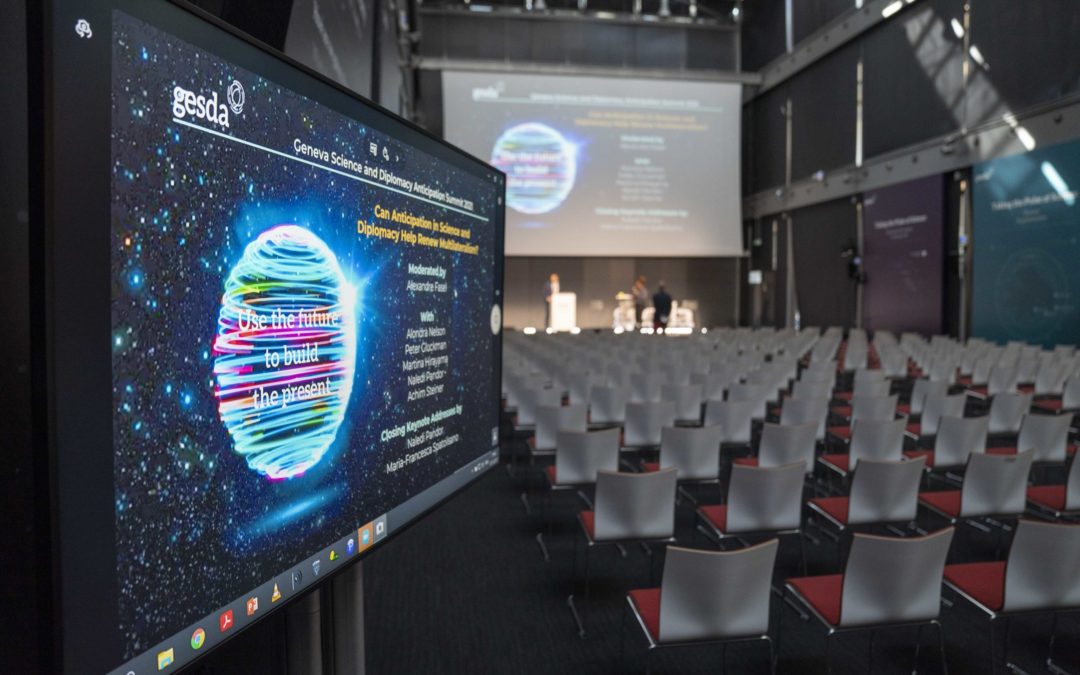Peter Brabeck-Letmathe, President of the Geneva Science and Diplomacy Anticipator (GESDA), opened the second annual GESDA Summit on Science and Diplomacy Anticipation in Geneva on Wednesday with a proposal to create an Open Quantum Institute (OQI) within the next three to five years. The goal is to accelerate the availability of this emerging technology to project developers around the world, including those interested in using it to achieve the UN Sustainable Development Goals (SDGs). The proposal builds on the findings from the GESDA Science Breakthrough Radar® released last year and the discussions held on this topic at the first 2021 Summit. The 2022 edition of the Radar was released Wednesday. It provides an overview of the scientific disruptions that are likely to become operational in 5, 10 and 25 years in five areas of importance to humans, society, and the planet.
According to research firm International Data Corporation (IDC), governments and businesses will invest some $16.4 billion in quantum computing by the end of 2027. GESDA wants to ensure that everyone has a role to play in this journey, and that the transformative impact of this technology is accessible to the entire global population as future quantum computers are eagerly anticipated.
The reason for the excitement is that these devices promise to solve currently intractable problems. Having access to these uniquely powerful computers could accelerate progress in crucial areas by enabling the development of more efficient drugs, cheaper fertilizers, longer-lasting batteries and more efficient solar panels. It could even kick-start advances in artificial intelligence with significant implications for a host of other sectors.
As conceived, the Open Quantum Institute will aim to provide global access to the cutting-edge technology of quantum computing when it becomes operational. The ambition for this Institute, whose possible contours will be presented and discussed for the first time during the 2022 Summit, is to give access to the development of quantum technologies to the most diverse groups and geographical regions so they can best tackle their own development challenges. A full feasibility study of the project is expected in 2023.
First Global Science & Diplomacy Curriculum & Youth Anticipation Initiative
The development and encouragement of science diplomacy is another priority of the GESDA Foundation, which, in light of the successful first Geneva Science Diplomacy Week organized this spring with 20 Geneva, Swiss and international partners, decided to pursue this approach. The aims are to build on Geneva’s rich tradition of scientific diplomacy by offering a comprehensive training program in this field and to disseminate the Science Breakthrough Radar® and make it a key resource for multilateral discussions and actions.
In this perspective and with this training spirit, GESDA launched in the summer of 2022 a pilot digital initiative from South Africa with Professor Mamokgheti Phakeng, a GESDA Foundation Board member and Vice-Chancellor of the University of Cape Town (UCT). She led an initial series of discussions with African youth on the major themes of the Radar. Three participants were invited to follow-up by contributing to the GESDA Summit. They will speak on Friday morning. As with last year, the Summit accords special importance to tomorrow’s young leaders, who are invited to attend and share their thoughts during sessions. The three finalists selected from the Youth and Anticipation Initiative competition will be joined on stage by students and young professionals selected by our partners, the Villars Institute, Swissnex Network and Young Academies.
2022 Edition of the GESDA Science Breakthrough Radar®
The Foundation’s main tool remains the GESDA Science Breakthrough Radar®, which is produced in partnership with the Fondation pour Genève. The 2022 edition describes significant advances on 28 emerging scientific topics (compared to 18 in 2021) in five areas: quantum revolution & advanced artificial intelligence, human augmentation, eco-regeneration & geoengineering, science & diplomacy, and knowledge foundations.
The number of scientists who contributed to the Radar is 774 (compared to 543 in 2021 = +43%). Their research covers 70 countries this year. It includes nine contributions on exploratory themes and puts greater emphasis on social sciences and humanities, notably aspects of philosophy and geopolitics, by describing trends and questions raised in these fields. It also examines ways that citizens can debate and act on emerging scientific issues.
Next year’s geopolitical perspective will gain from a strategic collaboration with Professor Jean-Marie Guéhenno of Columbia University and the Geneva Centre for Security Policy.
Creation of an Impact Forum
To achieve these goals, GESDA is setting up an Impact Forum headed by Patrick Aebischer, GESDA’s Vice President, whose mission is to provide the Foundation with the methods, expertise and financial resources needed for its development and growth. In particular, the aim is to obtain financial support from private and public non-commercial partners over the next ten years to finance core activities and to benefit the Geneva and Swiss ecosystems.
International political leaders’ perspectives to conclude the 2022 Summit
The Summit will close with a political roundtable on diplomatic and scientific anticipation that brings together President of the Swiss Confederation and Federal Councillor Ignazio Cassis, Swiss Secretary of State for Education, Research and Innovation Martina Hirayama, and government ministers from Estonia, Mexico, Morocco, Singapore, and the United Arab Emirates.
The Summit program includes 20 interactive sessions focused on science and its anticipation. GESDA’s proposed solution ideas will also be discussed in panels. Partner organizations such as CERN, the United Nations and XPRIZE will contribute to the program, which will be enriched, as it was last year, by a plenary session that is open to the public. This year’s plenary, which looks at synthetic biology, will be held at the Graduate Institute.
All appendices and further information are available here.
